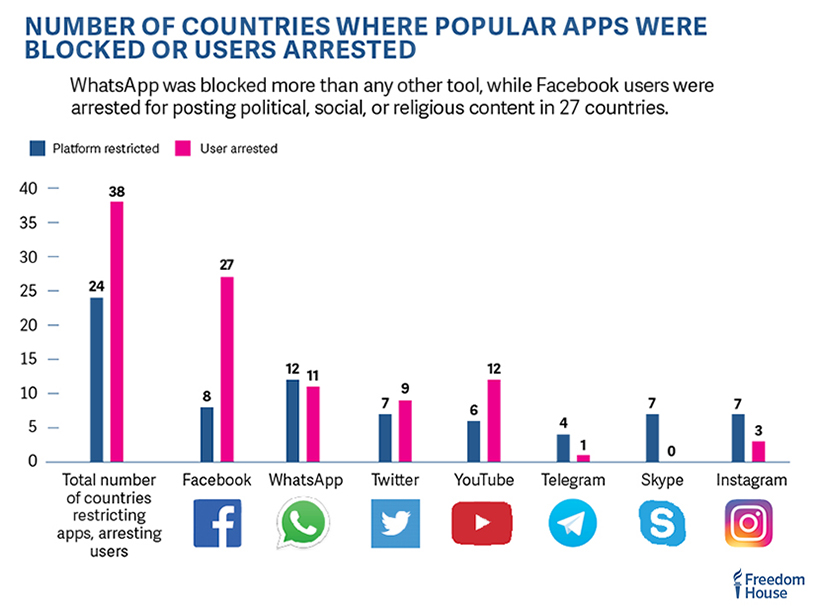Governments around the world are targeting encrypted messaging apps, like WhatsApp and Telegram, which can be used to spread news and information quickly and securely. This is one of the key findings from Freedom House’s 2016 Freedom on the Net report, which was released earlier this week. In fact, WhatsApp, which was purchased by Facebook in 2014, was blocked in 12 countries last year. This makes it the most blocked tool worldwide. In places where it has not been explicitly blocked, governments are requesting data about user communication and have even considered implementing laws that would make encrypted communication illegal.
The attempts to block messaging apps should concern the media development community because these applications are already playing an important role in news ecosystems worldwide. Indeed, there are three primary ways that messaging apps are already very important to media freedom.
-
As Important Conduits for News Stories
Governments often block messaging apps during periods of political turmoil because the news articles being circulated provide information that the government is hoping to suppress. This was the case in Ethiopia where both WhatsApp and Facebook were blocked after security forces killed dozens of protestors in August. This demonstrates that messaging apps are used for more than just funny banter among friends. They are actually vital conduits for information, especially in closed societies. Indeed, in war torn Syria, information passed around on messaging apps has been credited with even saving people’s lives by warning people about impending air assaults.
-
As Tools to Protect Sources
Journalists often now rely on messaging apps to collect information for their stories. This includes communicating with sources, who use these apps both because they are convenient to access on their smartphones and because many apps, including WhatsApp, Telegram, and Signal, now include end-to-end encryption. This means that only the end users have access to the content of messages sent. This level of privacy is important to protect sources who may only be willing to speak frankly if they believe their words and identity will not be shared with others. When messaging apps are built with encryption, they can help maintain trust between journalists and their sources. Check out an excellent resource by IJNET that examines the pros and cons for journalists of different messaging platforms.
-
As Ways to Build and Maintain News Audiences
Messaging apps create new ways for journalists and news organizations to interact with their audiences. This is the impetus behind initiatives like the GroundSource messaging platform that hopes to leverage apps to engage readers by helping them provide feedback on stories as well as identify new stories that otherwise would go unnoticed by the reporting staff. Given the ubiquity of these types of devices on mobile phones, even in disadvantaged communities, messaging apps provide an avenue to make news coverage more inclusive. When communities see their concerns and interests represented in news reporting, they are more likely to become long-term, engaged readers.
In short, attacks on messaging apps are troubling because they will make it harder to build healthy and open media ecosystems in the digital age. It is important that we understand these challenges not as isolated attacks against specific platforms, but rather against larger principles such as freedom of expression, privacy, and access to information that are central tenets of media freedom.
Daniel O’Maley is the Associate Editor at the Center for International Media Assistance.



Comments (0)
Comments are closed for this post.